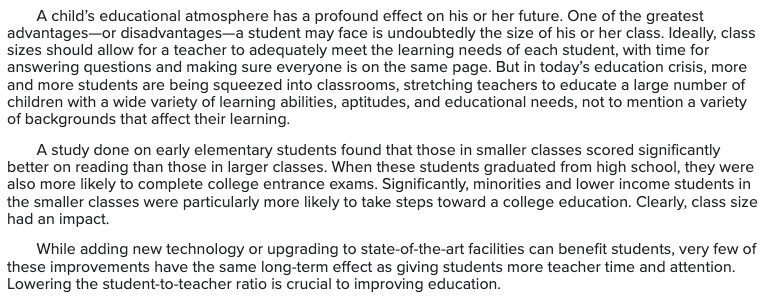FREE PACT Reading and Writing Questions and Answers
What is the meaning of the word "profound" in the first sentence?

Explanation:
Profound means "great or intense." While the word can be used to describe wisdom or challenges, it does not actually mean “wise” (a) or “challenging” (c). “Confusing” (d) is a synonym for “confound,” not "profound.”
From the passage, one can infer that _________:

Explanation:
The passage implies that small class sizes may be responsible for improved test scores, and thus improved learning. New technology (b) is mentioned as a potential benefit, but the passage does not specify what kind of benefit. The passage does not mention graduation rates (c), though it refers to students who do graduate. The passage discusses the impact on college education but makes no mention of different types of college degrees (d).
Which of the following is not an effect of smaller class sizes, according to the passage?

Explanation:
The passage mentions that students who graduate high school are more likely to pursue college, but does not discuss high school graduation rates.
Of the following, which choice uses the future verb tense?
Explanation:
Choice (a) uses the present tense ("specializes"); choice (b) uses the future tense ("will... acquire"), which is the correct answer; choice (c) uses the present perfect tense ("has worked"); and choice (d) uses the past perfect tense ("had... been").
Which sentence correctly uses the present perfect verb tense?
Explanation:
"We have delayed" is an example of the present perfect verb tense. "We had planned" (b) is an example of the past perfect verb tense. "We have ask" (c) is an incorrect form of the present perfect; it should be "we have asked." "We are ending" (d) is an example of the present progressive (continuous) tense.
In which tense and for which verbs does the -d or -ed ending apply?
Explanation:
Regular verbs, not all verbs (c), take the -d or -ed ending in the simple past tense, e.g., "walk" becomes "walked," "study" becomes "studied." The present perfect tense also takes this ending, but not for all verbs (a), only regular verbs (e.g., "have walked," "have studied"); irregular verbs differ (e.g., "speak," "spoke," and "have spoken”; "do." "did." and "have done”; and "go" "went, and "have gone"). The past perfect ("had" instead of "have") follows the same rule as present perfect: only regular verbs take -d or -ed endings, not irregular verbs (b).
Which of the following sentences shows disagreement between pronoun and antecedent?
Explanation:
This humorous quotation (used in Pogo by Walt Kelly, parodying Admiral Perry's "We have met the enemy and they are ours") shows disagreement between the antecedent "enemy" and objective pronoun "us."
The pronoun "you" agrees with the antecedent "person" (a). Regardless of sequence, the plural pronoun "They" agrees with the plural noun "people" (b). The possessive plural pronoun "their" agrees with the plural antecedent "Students" (c).
Advertisement
Ted is the ___________ employee in the company. Which word correctly completes this sentence?
Explanation:
Although comparatives are commonly formed by adding -er, and superlatives by adding -est, to adjectives, a general rule with longer (most with two syllables and all with three or more) words is not to add these endings as they become unwieldy, and modify them with "more" and "most" respectively. Hence options (a) and (d) are incorrect. Also, comparatives can only compare two, i.e., one to another, whereas superlatives compare one to plural others. Hence option (b) is also incorrect for this sentence.
If you had a dog on a leash right next to you, and a man had another dog on a leash across the park from you, how would you correctly describe both pets using demonstratives?
Explanation:
Demonstrative pronouns and adjectives indicate number and location. "This" is singular and indicates nouns nearby; "that," also singular, indicates nouns farther away. ("These" and "those" are their plurals.)
Choice (b) incorrectly indicates both dogs are right here, while choice (c) incorrectly indicates both are over there. Choice (d) reverses the correct use of both words.
Of the following examples, which has pronoun-antecedent agreement?
Explanation:
"Their" is plural, agreeing with antecedent "members," and because the plural is gender-neutral, there is no gender disagreement. However, the other choices all disagree in gender between pronoun and antecedent: her self-portrait portrayed her, not him (b); Mr. Davis wanted to supervise everything himself, not herself (c); and Susie asked her brother to give her a ride home, not him (d).
Among the following, which version uses the correct relative pronoun?
Explanation:
The relative pronoun "which" should be used for nonrestrictive (or nonessential or non-defining) clauses, i.e., they add information that is supplemental but not essential or required. "Who" (a) is used to indicate persons, not things. "That" (b) should be used for restrictive (essential or defining) clauses providing essential (necessary) information (e.g., "things that matter"). "What" (c) should never be substituted for "that," a mistake some people make. That the advice helped is not essential to know which advice (d).